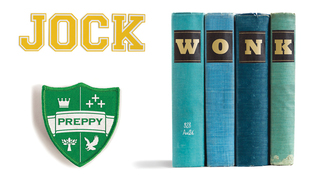 loading
loading
Arts & CultureYou can quote them: collegiate slangOn the origins of “preppy,” “jock,” and ”wonk.” Yale law librarian Fred R. Shapiro is working on the second edition of his Yale Book of Quotations.  John Paul ChirdonView full image“Group pride is built on the rejection of an out-group,” writes Jerome Neu in Sticks and Stones—and to reject members of an out-group effectively, one needs to insult them. Group pride doesn’t require delivering the worst kinds of insults; what Neu calls “insult humor” also works very well. Insult humor is apparently what spawned some of the most widespread and long-lived collegiate slang I know of: the classic preppy, jock, and wonk. What’s more, the words were probably all spawned at well-known elite institutions to the northeast and southwest of New Haven. An article in the December 17, 1962, Sports Illustrated, about the Yale-Harvard football game weekend, explained the three words for a lay audience:
Preppy came into wide circulation in 1970, when the hugely popular book and movie Love Story, by Yale classicist Erich Segal, applied it to the main character, Harvard student Oliver Barrett IV. Before the advent of digital texts, the Oxford English Dictionary’s first citation of preppy was dated 1970. Today, a search of the Harvard Crimson retrieves a 1956 usage relating to Eliot House. The Daily Princetonian archives yield multiple 1954 occurrences. But wait—could preppy have started at Yale? A November 24, 1951, article in the Yale Daily News digital archive at the Yale University Library declared: “There are ‘preppy’ groups and ‘doggy’ groups—never the twain shall meet.” (Don’t ask me about the curious canine reference: I have no idea.) But this does not mean that Yale is the true provenance of the p-word. First of all, the 1951 article is all about student life at Harvard. But more than that, two days after that article appeared, an editorial note in the November 26, 1951 YDN made it clear that the November 24 “issue” was actually a parody—created by none other than the Harvard Crimson. (Apparently the parody was so convincing that the University Library included it in its run of the Yale newspaper.) The argument for Harvard as the birthplace of preppiness (at least terminologically) is solid. Oliver Barrett was not only a preppy, but also a jock. The OED’s earliest evidence for this term, which is a shortening of jockstrap, is from 1963. The earliest I have found is from the Daily Princetonian, September 24, 1953: “Sophomore Jocks -- Interested in Lake Carnegie Tug o’ War… sign up at 102 Holder.” The Crimson’s first use was not until 1957. Wonk, signifying a studious person who has absolutely no social life—and possibly deriving from the word know spelled backward—is dated 1962 by OED. The oldest appearance I have discovered is in Time magazine, March 1, 1954. Time, writing about Harvard, noted that “There are still cliques—of the literary, the fashionable, and the wonks (latterday meatballs).” Chalk this one up as a Harvardism. Its offspring, “policy wonk,” is now widely used in the political sphere, where it was popularized in the 1992 presidential race. In that election the Democrats fielded an all-policy-wonk ticket of Bill Clinton ’73JD and Al Gore. Gore, a Harvard College graduate, was a preppy, a jock, and a wonk and is said to have been a model for Oliver Barrett IV.
|
|
2 comments
-

Jonathon Green, 1:18pm November 08 2014 |  Flag as inappropriate
Flag as inappropriate
-

Michael L. Lazare, '53, 1:18pm December 05 2014 |  Flag as inappropriate
Flag as inappropriate
The comment period has expired.As regards jock, one might note this use, which falls between two stools:
1944 P. Kendall Dict. Service Slang n.p. Jock strap Marine ... athlete
We still occasionally read about "white shoe law firms." I believe that phrase is derived from the white shoe (bucks)/black shoe divide in my undergraduate days. "White shoe" was shortened to "shoe." Can anyone tell me if that term is still in use?